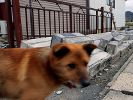Eye For Film >> Movies >> No Man's Zone (2011) Film Review
No Man's Zone
Reviewed by: Scott Macdonald

The 2012 edition of the Edinburgh International Film Festival is showing a selection of documentaries on the subsequent effects of the Fukishima nuclear disaster. No Man's Zone is one which elects to focus on the devastation of the landscape within the affected 20km zone - and the people, mostly farmers, who live in it.
The film opens with a long 360-degree-pivot shot around the land damaged by the tsunami, within viewing distance of Reactor #1. It is a stunning piece of footage, deathly quiet and sombre. It's interrupted with a soliloquy about humankind's reaction to seeing images of devastation - we are "addicted to all images of destruction". It's certainly an arresting start.

The rest of the film doesn't warrant it. In spite of the filmmaker's efforts, the interrogations of the refugees are thin - they elucidate small details, which come with precious little context. In an attempt to repair this, director Toshi Fujiwara elects to use voice-over after the fact.
It's a reasonable narration - softly spoken, accusatory at times and sad. Throughout the overtly portentous purple prose there are occasional moments of lucidity - discussing our reactions to and the purpose of imagery. Do striking images incite us to act, or does the lack of them within culture cause us to forget? It's a worthy goal and an interesting hypothesis for a documentary of its own. Here, it's poorly flubbed; the idea drowns within the documentary's contemplative dullness and unfocused testimonies.
On April 22nd, Japan declared a state of emergency - and the 20km zone was almost completely evacuated. There's a troubling thought that emerges during this. One of the observers notes that the influx of documentary filmmakers and news corps saturated the media. The Japanese authorities were concerned - and they elected not to deal with the PR fallout, choosing to stonewall and ignore criticism. In response, No Man's Zone moves to refugees, and elicits yet more testimony.
There are other lengthy sequences, driving through the devastated villages and towns, with the displaced discussing human tragedies, cut around imagery - waves of devastation and the debris of lifetimes - towns reduced to a cake of splintered wood, dead vegetation, CDs and hundreds of very human knick-knacks.
There's a remarkably contemplative and lengthy conversation with an elderly couple. They want to preserve their family home; it's survived largely intact, although moved with the tide. The cost is prohibitive, but they choose to do it anyway - hanging a sign. "This is my house, please do not demolish it!"
Ultimately, No Man's Zone is a crushingly dull documentary, at least twice as long as the selected material warrants. Ironically, what we mostly lack is a sense of time passing to let these stories unfold. Their stories are told as is - a series of testimonies, dressed up in self-loathing destruction pornography, combined with weak reasoning and attempts at commentary.
It's a poor start to the Fukishima programme.
Reviewed on: 21 Jun 2012

















